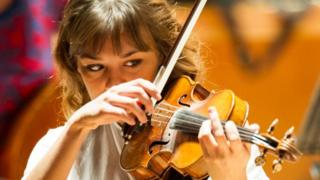BBC Proms 2020: Line-up will be 'flexible' to adapt to the pandemic
By Mark Savage BBC music reporter Image copyright Getty Images
Image copyright Getty Images
Organisers of the BBC Proms are having to devise multiple programmes for every concert, because of uncertainties over how many performers will be allowed on stage due to the coronavirus pandemic.
The 2020 season will mostly consist of highlights from the BBC's archive.
But there are hopes of moving back into London's Royal Albert Hall for two weeks of live shows from 28 August.
Conductor Sakari Oramo says he is currently planning "four different options" for the first night.
"We're dealing with constantly changing regulations," he says.
"The advice on how many players we can have, whether we can have singers, whether there are restrictions to certain sections like the wind or brass, has all been - to put it mildly - slightly unclear.
"I completely understand it. I don't find it strange that there's a lot of uncertainty going on. But of course the number of players we can have, and the distances we need to have between players, will affect the programme greatly."
In an official guide to the 2020 Proms, published on Friday, the BBC said the line-up of artists and music for the season's two-week finale could not be announced until "nearer the time" due to the pandemic.
The delay will "allow for utmost flexibility in responding to the safety guidelines at the time," it added.
Audiences are unlikely to be allowed to into the Royal Albert Hall to watch the performances, which will be broadcast instead on radio, TV and the iPlayer.
"There won't be a Proms atmosphere in the same way," said Oramo. "But, of course, once the music gets going, the music will take us where it needs to take us.
"I'm sure the first night will be an especially important moment, not only for the orchestra but also for the whole music-loving nation, and the world."
When the BBC Symphony returns to the stage in August, they won't be the first to resume playing large-scale orchestral music.
Last month, members of the Berlin Philharmonic returned after weeks of isolation, to play a programme of Ligeti, Pärt, and Barber.
Due to social distancing regulations, only 15 players could be onstage at a time. The strings sat two meters apart. The woodwinds and brass were five meters apart - as their instruments expel great quantities of air, during a pandemic that affects the respiratory system.
In England, choirs are also being advised not to perform together because of the risk of spreading the virus.
The effects of the coronavirus will be felt in another way during this year's Proms, with a number of new commissions responding to the global pandemic.
These include a new piece by Thomas Adès for the LSO Prom and Andrea Tarrodi for the Last Night of the Proms.
Oramo says the first night will also reflect the upheaval of the last four months.
"We've gone through a list of pieces that are suitable to that purpose," he says, "but obviously as well as reflection, there needs to be something uplifting.
"So I hope the final result will include those two opposite fields of energy: Quiet reflection and mourning from one side, then positive energy and optimism on the other."
Elsewhere, the "Fantasy Proms" season will draw on the BBC's rich archive of performances, with highlights including Leonard Bernstein conducting the Vienna Philharmonic and the celebrated 2007 Proms debut of the Simón Bolívar Symphony Orchestra of Venezuela conducted by Gustavo Dudamel.
This year also sees the first ever TV broadcast of the hugely popular Radio 1 Ibiza Prom from 2015, in which featuring Pete Tong, Jules Buckley and the Heritage Orchestra transformed dance classics in to orchestral masterpieces with the help of John Newman and Ella Eyre.
Live performers at the Royal Albert Hall will include violinists Nicola Benedetti and Alina Ibragimova; cello sensation Sheku Kanneh-Mason and his pianist sister Isata Kanneh-Mason; and sitar virtuoso Anoushka Shankar with electronic artist Gold Panda.
It will culminate in a pared-back version of the traditional Last Night, with soprano Golda Schultz joining conductor Dalia Stasevska and the BBC Symphony Orchestra.
Follow us on Facebook , or on Twitter @BBCNewsEnts . If you have a story suggestion email entertainment.news@bbc.co.uk .
Features
Elsewhere on the BBC
The heat is back on in the kitchen!
Stream Celebrity MasterChef on BBC iPlayer now
Full article The heat is back on in the kitchen!Daily news briefing direct to your inbox
Sign up for our newsletter
Full article Daily news briefing direct to your inboxfrom Via PakapNews